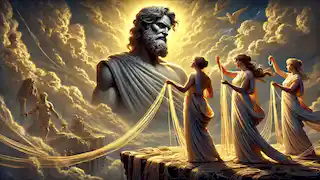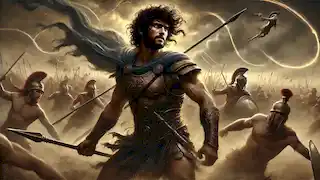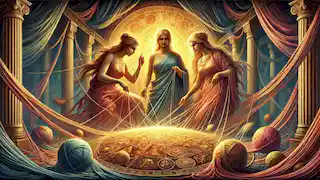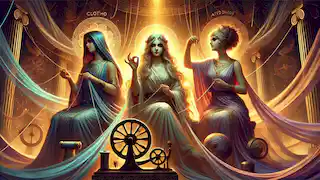In ancient Greece, beyond the knowledge of gods and the reach of mortals, three enigmatic figures wove the threads of existence for every being. These were the Fates, known as the Moirai in Greek mythology, who possessed the unparalleled power to dictate the course of life and death. From the grand halls of Mount Olympus to the humble lives of mortals below, none could escape the watchful eyes of Clotho, Lachesis, and Atropos. In this tale, we delve deep into the lives of these powerful sisters, exploring their origins, their purpose, and the lives they touched in ancient Greece. This story speaks to the balance between free will and destiny, revealing that even the gods themselves were bound to the decisions of the Fates. Join us on this journey as we weave through the tapestry of time and uncover the profound mysteries of the Fates. In the beginning, there was Chaos—a vast, unending void from which all existence emerged. From Chaos sprung Gaia, the Earth, who bore the heavens, the mountains, and the seas. As she watched her creations grow, Gaia knew that something was missing. The world was vibrant and alive, but it lacked order and direction. Thus, she called upon the cosmos, beseeching it for guidance. In answer to Gaia’s plea, the first of the Fates was born—Clotho, the Spinner. With nimble fingers, Clotho began to spin the thread of life, carefully weaving each strand with purpose and intent. She spun not only for mortals but also for the gods, for even the immortals were subject to the whims of time. Clotho's work was meticulous, her threads vibrant and filled with the energy of new beginnings. But a single thread was not enough to govern existence. From the stars above, Lachesis, the second Fate, descended. Known as the Allotter, Lachesis held the duty of measuring the threads spun by her sister. She would hold each thread with care, determining the length of a life, the path it would follow, and the trials and triumphs it would encounter. Lachesis knew that a delicate balance was essential, for if life continued without end, chaos would once again reign. Finally, from the shadows emerged Atropos, the last and most feared of the sisters. While Clotho spun and Lachesis measured, Atropos wielded the scissors that would ultimately sever the threads. Her presence was solemn, as she brought closure to lives and stories. Without her, the world would drown in unceasing chaos, unable to make room for new beginnings. Thus, the three sisters became the Moirai—the Fates who governed destiny itself. Together, they embodied the cyclical nature of existence, ensuring that every birth was balanced by death, and every journey had its end. The Fates, though respected and feared by mortals, held a particularly complex relationship with the gods of Olympus. Unlike other deities, the Fates were immune to Zeus’s mighty influence. While he wielded thunderbolts and ruled over heaven and earth, even he could not alter the designs of the Moirai. This frustrated Zeus, for he was accustomed to exerting his will over all beings, mortal and divine alike. One evening, as Zeus observed the threads woven by the Fates, he noticed one that particularly troubled him. The thread belonged to a mortal hero destined for greatness, yet bound to a tragic end. Intrigued by the hero’s fate, Zeus approached Lachesis, hoping to convince her to alter the thread’s course. But Lachesis, in her quiet wisdom, merely shook her head. "Even you, mighty Zeus, are subject to the path we have laid," she murmured. The gods watched the Fates with a mixture of reverence and trepidation, for they knew that even they could not escape the Moirai's influence. Only the Moirai themselves could shape and sever lives as they saw fit. Hera, queen of the gods, respected the Fates but often found herself resentful of their power. She witnessed as they dictated the lives of mortals and gods alike, watching her own children walk paths that were not of her choosing. One day, Hermes, the swift messenger, approached the Fates with an unusual request. A mortal he had grown fond of had met an untimely end, and Hermes pleaded with Atropos to reverse her decision. Atropos remained unmoved, her expression stoic. "Our duty is absolute," she replied, her voice calm but resolute. Disheartened, Hermes returned to Olympus. Even his charm and wit could not sway the sisters. The gods, as powerful as they were, learned to accept the immutable power of the Moirai, understanding that they themselves were but threads in a vast tapestry beyond their comprehension. The mortal world was filled with stories of the Fates, whispered in darkened taverns, recited by poets, and sung by bards. To the mortals, the Fates were both a source of comfort and terror. They knew that the Moirai watched over them from birth to death, guiding their lives according to a preordained plan. In a small village nestled between the mountains, a mother gave birth to a child under the light of a full moon. The villagers believed that the Fates blessed children born under such auspicious conditions, for they were said to carry a thread spun with great promise. The mother, Elara, named her daughter Calliope and prayed to the Fates to grant her a life of joy and prosperity. As Calliope grew, it became evident that her thread was woven with the colors of courage and strength. She possessed a rare spirit, unafraid to challenge tradition or question authority. Her defiance caught the attention of Lachesis, who observed the girl’s path with a sense of intrigue. "Her thread is bound to be filled with both triumph and sorrow," Lachesis mused, measuring Calliope's fate. Years passed, and Calliope's life followed a path filled with both love and heartache. She fell in love with a young warrior named Thales, and together they dreamed of a future free from the constraints of fate. But Atropos knew the end that awaited them, her scissors poised to sever their shared thread when the time was right. One day, as Calliope and Thales embarked on a journey to seek the Oracle of Delphi, tragedy struck. Thales was wounded in a battle, his life slipping away with each passing moment. As Calliope held him in her arms, she cried out to the Fates, begging them to spare him. But the Fates remained silent, for Thales' time had come, and Atropos’s scissors were unyielding. When Thales breathed his last, Calliope felt the weight of destiny like never before. Her grief was tempered by a profound understanding—that she was but one thread in a tapestry woven by forces beyond her control. Legends told of a hidden lair where the Fates spun their threads, a place untouched by time and unseen by mortal eyes. Many had tried to find it, but none had succeeded. Determined to confront the Moirai herself, Calliope undertook the treacherous journey to the fabled lair. After days of arduous travel, she arrived at the mouth of a cave veiled in mist. As she entered, a chill ran through her spine, for she knew she was nearing the realm of the Fates. The cave was filled with the sound of spinning, the soft hum of Clotho's wheel resonating like a heartbeat. In the heart of the cave, Calliope found the three sisters, each absorbed in her work. Clotho's hands moved deftly as she spun, Lachesis's gaze was focused as she measured, and Atropos's scissors gleamed in the dim light. "Why have you come here, child?" Clotho asked without lifting her gaze. "I seek answers," Calliope replied, her voice steady. "Why must we suffer? Why do you weave lives with such sorrow?" Lachesis looked up, her eyes kind but distant. "Life is not ours to give meaning to, nor is it ours to justify. We merely maintain the balance." Calliope's anger flared. "Then why not show mercy? Why not spare those who suffer?" Atropos sighed, a note of sorrow in her voice. "Mercy disrupts the cycle. We are bound to our duty, just as you are bound to your fate." With that, the Fates turned their attention back to their work, and Calliope knew that her questions would remain unanswered. She returned to her village, forever changed by her encounter with the Moirai, her heart bearing the weight of the knowledge that life, in all its beauty and tragedy, was but a thread in the endless tapestry woven by the Fates. The Fates played a pivotal role in the lives of many Greek heroes, for they wove the destinies of those who would shape history. Achilles, the legendary warrior, was one such figure. His mother, Thetis, pleaded with the Fates to grant her son a long life. But the Moirai knew that Achilles’ destiny was entwined with the glory of a brief, illustrious life cut short by heroism. As Clotho spun Achilles’ thread, she added vibrant hues of courage and strength, while Lachesis measured it with solemn care. Atropos, however, waited patiently, knowing that her moment would come on the plains of Troy, where Achilles would meet his fated end. During the Trojan War, Achilles fought valiantly, his name echoing through history as one of Greece’s greatest heroes. Yet, despite his prowess, he could not escape the destiny the Fates had woven for him. In a moment of vulnerability, Achilles met his end, and Atropos severed his thread, marking the conclusion of a life that would be remembered for generations. Even the gods mourned Achilles, but they knew that his fate was sealed long before his birth. In this way, the Moirai shaped not only the lives of ordinary mortals but also the legacies of those who became legends. Over time, the Fates became symbols of life’s unpredictable nature, revered and feared by those who sought to understand the mysteries of existence. Philosophers and poets pondered the role of the Fates, questioning the extent to which destiny governed human lives. They wondered whether free will existed or if every action was merely a step along a predetermined path. The Fates remained silent observers, their hands ceaselessly working to spin, measure, and cut the threads of life. They watched empires rise and fall, witnessed the birth of ideas that would change the world, and saw the end of countless lives. Through it all, they continued their work, unwavering in their purpose. As time marched forward, the Fates faded into myth, their existence remembered only in tales and legends. Yet, their legacy lived on, a reminder of the delicate balance between fate and choice. Though unseen, the Fates continued to shape the world, their influence woven into the very fabric of existence. For every birth and every death, every triumph and tragedy, the Moirai were there, guiding each life along its destined path. They were the silent architects of destiny, their threads binding the world together in an endless cycle of life and death. And so, the story of the Fates lived on, a testament to the mysterious forces that govern all things.The Origin of the Fates
The Fates and the Gods

The Fates and Mortal Lives
A Visit to the Fates’ Lair

The Fates and Heroes

The Legacy of the Fates

The Story of the Fates
Reading Time: 10 min

About Story: The Story of the Fates is a Myth Stories from greece set in the Ancient Stories. This Dramatic Stories tale explores themes of Wisdom Stories and is suitable for All Ages Stories. It offers Cultural Stories insights. Follow the timeless journey of the Fates, who hold destiny in their hands.


















